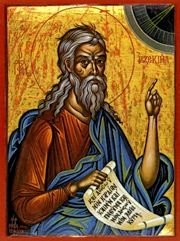Is the Mass a sacrifice?
The following is a Q & A which was posted on Zenit.org:
Scriptural Basis of the Mass as Sacrifice
ROME, SEPT. 26, 2006 (Zenit.org).- Answered by Father Edward McNamara, professor of liturgy at the Regina Apostolorum university.
Q: Where are we commanded to have a sacrifice in our formal worship of God? Protestants, for the most part, worship with singing, some collective prayers and long sermons. Where in the Bible does it say that proper worship contains a sacrifice? Also a review of where in the Bible the Mass parts come from and why we include them in Mass would be useful. Again, it will come down to convincing a "sola scriptura" believer that Scripture says we must do it. Any help would be appreciated. -- J.C., Leavenworth, Kansas
A: A full answer to this question exceeds the possibilities of this column. There are, however, many worthy resources available online. Web sites such as Catholic Answers
(www.catholic.com) contain, among other elements, Father Mitch Pacwa's "Is the Mass a Sacrifice?" (see for example http://www.catholic.com/library/sacraments.asp)
The Old Testament contains many divine commands to perform sacrifices. All of the complex liturgical rituals described in Leviticus, for example, are ostensibly commanded by God through Moses.
Perhaps the most important sacrifices commanded by God in the Old Testament were those in which the Almighty sealed a covenant. This includes the one with Noah after the flood, the pact made with Abraham, and above all the sacrifice of the paschal lamb in Egypt, a covenant that was completed 50 days later with another sacrifice at Sinai.
It was this covenant that was renewed each year at the Passover by means of a sacrificial ritual that was a "memorial" ("zikkaron" in Hebrew). It was not a mere recalling but rather one that ritually made present and ratified and renewed the saving events that had occurred so many years before.
For Catholics, the central divine command to worship, using a sacrifice, came from the lips of Christ when he told the apostles at the Last Supper, "Do this as in memory of me."
In doing so, he specifically recalled the Jewish Passover as a memorial and applied it to himself and his upcoming sacrifice on the cross, with a totally new and definitive meaning.
In this context Our Lord's words "This is my body, which is given for you" (Luke 22:19) correspond to those of Exodus 12:27: "[This ritual] is the sacrifice of the Passover in honor of Yahweh" when he freed Israel from slavery in Egypt.
The words "For this is my blood of the covenant, which is poured out for many for the forgiveness of sins" (Matthew 26:28) echo those of Exodus 24:8 when Moses says: "This … is the blood of the covenant that Yahweh has made with you."
We are thus before a unique sacrifice, the memorial sacrament of Christ's paschal sacrifice. Through it he has brought salvation to all mankind and sealed a new and eternal covenant in his blood.
Although the apostles probably did not immediately grasp the full meaning of Christ's gesture in the cenacle, their reflection on his words and actions and their familiarity with the Passover as a memorial quickly led them to understand that Our Lord had commanded them to repeat the ritual that he had established.
They understood that this ritual was the definitive paschal sacrifice which made present Christ's unique sacrifice on Calvary and in doing so ratified and renewed the new and eternal covenant.
Therefore, God has commanded us to worship with a sacrifice, his own unique sacrifice.
All other forms of ritual sacrifice have fallen by the wayside as Christ's sacrifice has an infinite worth that absorbs all the values and intentions expressed in the ancient sacrifices.
The Mass is a sacrifice insofar as it is the memorial that ritually renews and makes present to us, in time, Christ's once-and-for-all sacrifice on the cross.
The personal prayers and sacrifices of Christians reach their fulfillment when they are united to Christ's sacrifice through full, devout and active participation at Mass.
As to where in the Bible the various parts of the Mass are found, the answer is less clear. In a way it is everywhere and nowhere.
Everywhere, because the entire Mass is animated by Scripture. Almost all of the prayers and texts have a scriptural background and the entire rite is developed as a fruit of Christ's command to continue his actions.
Nowhere, in the sense that we will not find explicit commands to say, "Sing the Sanctus after the preface." Rather, the ritual has developed over time as a response to the scriptural exhortation to pray, to repeat the sacrifice, etc.
In this case even a Protestant would have to accept that the details of his worship (songs, psalms and long sermons, etc.) are found in the Bible only in very general terms.
Labels: apologetics, Catholic Question-Answer, Eucharist, priesthood


<< Home